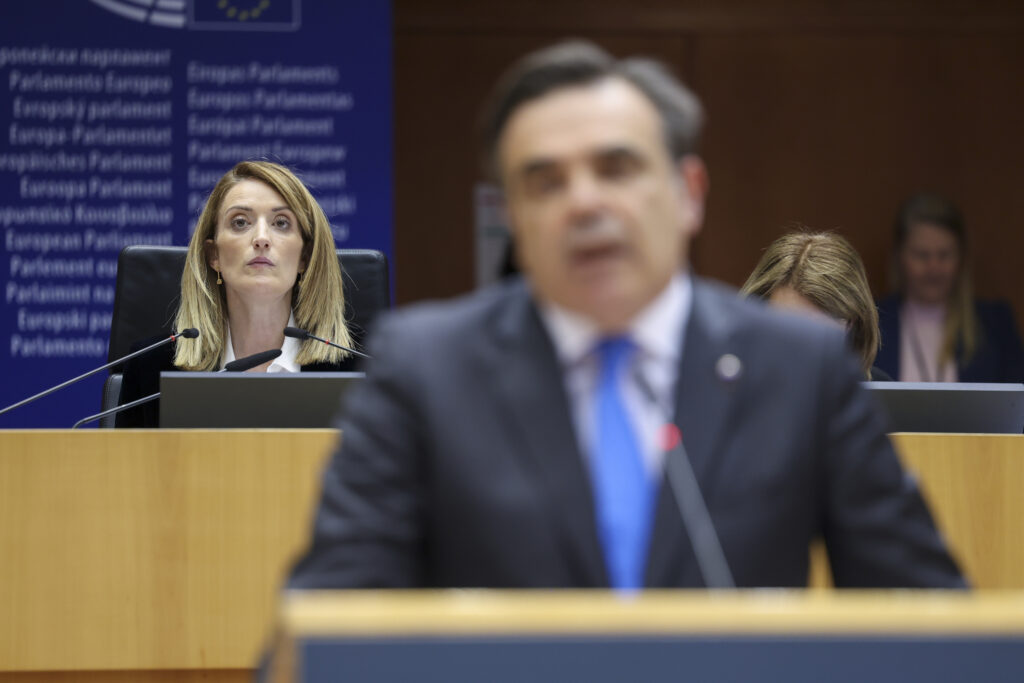The European Parliament has voted to adopt the Asylum and Migration Pact, bringing years of bitter negotiation to an end and significantly toughening the bloc's policy towards migrants.
MEPs approved a package of five interlinked laws, each with an average of 300 votes for and 70 against. "The Migration Pact is adopted!" MEP and rapporteur Tomas Tobé (EPP) posted on X (formerly Twitter). "Now the EU can regain control of our external borders, reduce economic migration and put in place a common migration policy that is well functioning and fit for the long-term."
Protestors disrupted the vote in the hemicycle, chanting: "This Pact kills, vote no." European Parliament President Roberta Metsola (EPP) responded to the demonstration stating that "this is a sovereign moment [...] This is our job and we will continue doing it."
Live: Protests in the European Parliament against the new Migration Pact.#EU #MigrationPact pic.twitter.com/IHEFd2w2nT
— Jakob Kerren (@JakobKerren) April 10, 2024
What does this mean for EU migration policy?
The Pact toughens conditions for asylum seekers at European borders through increased use of detention, including for families and children.
The use of biometrics and facial recognition will become more widespread, and the long-awaited Eurodac system will take the fingerprints of new arrivals aged six years old and up. New 'crisis' regulation will allow authorities to override rules in the case of large and unprecedented influxes of people.
Advocates of the bill tout a 'mandatory solidarity' mechanism which aims to spread migrants across Member States more efficiently. Countries can choose to pay €20,000 into a solidarity fund for every individual they refuse to take in.

Protestors disrupt the vote on the EU Migration and Asylum Pact. Credit: X
The Pact was first proposed in 2016 in the wake of large migratory flows towards Europe after the war in Syria. Following years of deadlock, EU institutions finally managed to nail down a deal in December, but human rights organisations have repeatedly denounced the "deadliest set of migration policies in history."
Contested from all sides
Just ahead of the final vote on Wednesday, 161 civil society organisations reiterated these concerns in an open letter to EU lawmakers.
"The final vote on the Asylum and Migration Pact on 10 April is the EU's last chance to protect children seeking safety in Europe," stated Federica Toscano, Senior Advocacy Advisor from Save the Children Europe. "The decision will impact children fleeing conflict, hunger and death for decades. It is imperative the EU gets it right."
The Pact "will likely lead to widespread human rights violations across Europe and at its borders," says the Platform for International Cooperation on Undocumented Migrants (PICUM). "Under the EU Migration Pact people will undoubtedly experience even more violence and pushbacks in their migration journey and at borders," stated PICUM Director Michele LeVoy.
Far-right critics argue the Pact does not go far enough to curb migration. "The Migration Pact puts nations under control of the legal impunity of NGOs complicit with smugglers," French far-right politician Marine Le Pen posted on X. "On 9 June, we will put an end to the accelerated pursuit of policies to encourage and organise mass immigration."
Meanwhile, both the Greens/EFA and The Left in the European Parliament lament the approval of a text that sidelines human dignity. The former regrets a "lack of solidarity" with migrants while the latter stated that this is a "dark day for human rights".

